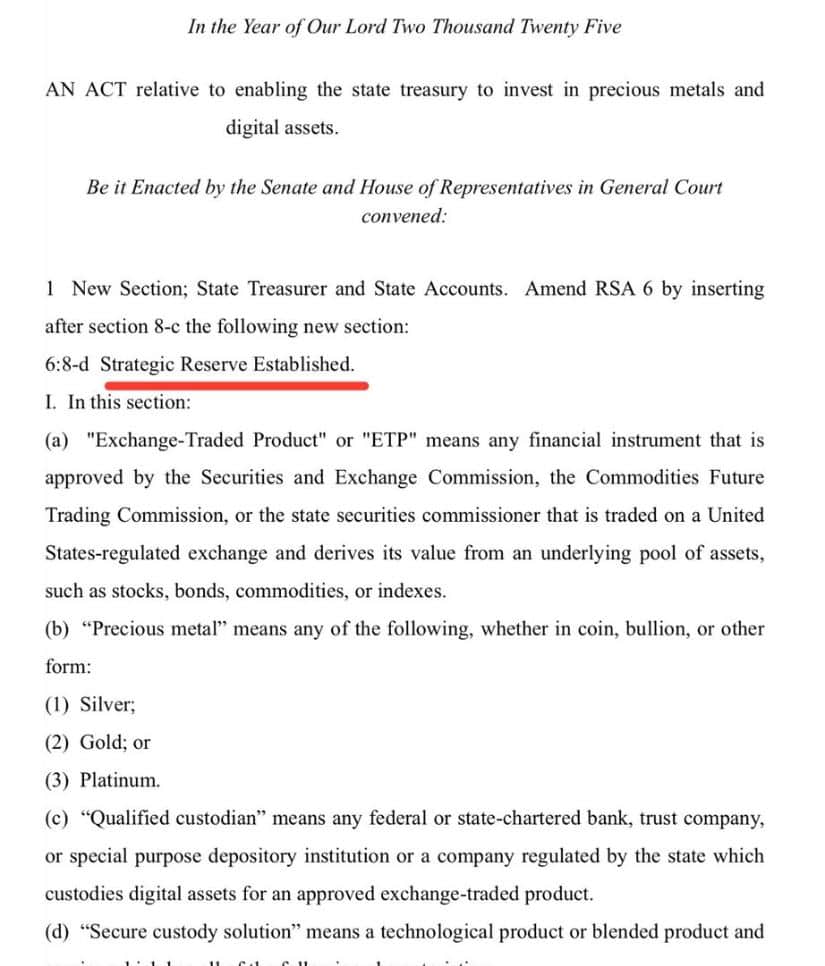
The proposal, introduced in the State House and identified as “AN ACT ($0.28) relative to enabling the state treasury to invest in precious metals and digital assets,” has garnered attention from advocates who see digital currencies as a hedge against economic uncertainty.
The bill, shared publicly by a prominent cryptocurrency advocate on social media, would add a new section to state law under RSA 6, titled “6:8-d Strategic Reserve Established.” Supporters say it would authorize the state treasurer to place funds in exchange-traded products tied to cryptocurrencies, provided they meet regulatory requirements set by entities such as the Securities and Exchange Commission, the Commodities Futures Trading Commission, or the state’s own securities commissioner. In addition, the proposal includes definitions for “precious metal,” covering silver, gold, and platinum, as well as guidelines on “secure custody solutions” for storing digital assets.
Dennis Porter, a well-known cryptocurrency commentator, took to social media to announce the development, and post the following bill.

Source: X
Techno-optimism
State Representative Keith Ammon, a Republican who represents Hillsborough District 42, is the lead sponsor of the bill. His background includes advocacy for blockchain technology and what some lawmakers describe as “techno-optimism.” If passed, the legislation would empower the state to hold certain digital assets alongside more traditional reserves, reflecting a growing trend among policymakers who see cryptocurrency as a strategic store of value.
New Hampshire’s move follows broader discussions at the national level about Bitcoin’s role in the U.S. financial system. Some officials have recently floated the notion of establishing a federal “bitcoin strategic reserve,” echoing suggestions that came out of Washington over the past year. Supporters of such a reserve argue that adding digital assets to government holdings could offer a safeguard against debt concerns and potentially deliver significant returns, especially if cryptocurrency prices continue to rise.
Prominent figures have voiced optimism about the effects of government adoption of Bitcoin. One professional quoted recently suggested that if governmental proposals go forward, “the sky’s the limit because bitcoin has a fixed supply.” Others have predicted prices well beyond $100,000 per bitcoin, forecasting multi-trillion-dollar market capitalizations that could rival or surpass those of precious metals.
Critics of the new legislation caution that while digital assets like Bitcoin have generated enthusiastic support among individual investors and tech-savvy lawmakers, they remain volatile and lack the same track record as more established commodities. Skeptics argue that any government-held asset should demonstrate proven stability and utility in emergency scenarios, comparing the new approach to the well-known U.S. Strategic Petroleum Reserve.
Even so, the proposed New Hampshire bill sets out a detailed structure. It defines a “qualified custodian” as a financial or depository institution regulated by federal or state banking authorities, which would be entrusted to safeguard the digital assets acquired. Additionally, it mandates a “secure custody solution,” ensuring that cryptographic private keys remain within a system dedicated to protecting them from theft or accidental loss.
Supporters of the measure insist that it holds the potential to secure the state’s future economic interests. They point to rising acceptance of Bitcoin across industries and the notable gains in the cryptocurrency’s value over the past year. In fact, respected ETF custodians such as Bitwise have predicted that the price of Bitcoin could reach $200,000 in 2025. If approved in the upcoming session, the law could position New Hampshire as a pioneer among states looking to adopt alternative investments.







